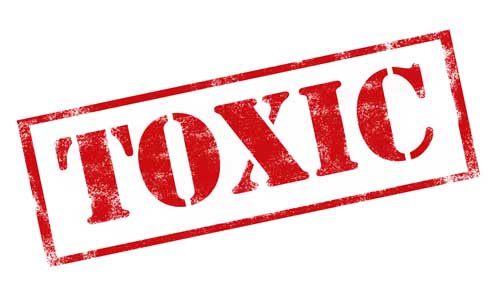
Recognizing Toxic Relationships
What is a toxic relationship?
Any relationship that is damaging or destructive is considered toxic.
Recognizing toxic relationships can be difficult. Toxic relationships literally violate boundaries. This includes physical, emotional, social, and spiritual violation, which damages the psyche. The term psyche is actually derived from the Greek word for ‘soul’, but used in psychology to refer to the elements of the mind. Consider violations of the psyche as violations to your mind and soul. Your soul is your vitality and the very essence of who you are. It is your emotional, intellectual and spiritual energy. Violations to this part of you may be the least definable and least detectable, therefore have the potential to cause the most harm. Your psychic boundary embodies all the non-physical aspects of you that make up your sense of self, including your thoughts, beliefs, experiences, memories, ideas, feelings, emotions, drives, desires, wants, likes, dislikes, etc.
When our psyche is violated, how do we function as the unique, independent soul that we were born to be? This is at the core of our every action. When someone toxic manipulates another person’s psyche, they can exert a great deal of control over them. This can be seen in cults, politics, workplaces, relationships and social groups. You might have experienced certain manipulative tactics used at some point in your life without even realizing it as they can be well disguised. Without knowing all the different ways that people attempt to control others, the experience of being in a toxic relationship is bewildering. This bewilderment is what leads to symptoms of anxiety, depression, apathy, and loss of self-confidence.
To begin to demystify the confusion around toxic people and the baffling emotions and behaviors, it helps to understand the core characteristics of manipulative people, the driving force behind toxicity.
There are three fundamental components of manipulative, toxic people: Insecurity, Control, and Entitlement (ICE).

I.C.E. = Insecurity, Control, Entitlement
Toxic people share some fundamental characteristics. The combination of the three ICE components (insecurity, control and entitlement) structures their belief system, causing manipulative people an unconscious desire to try to influence the world around them. The reason is that beneath ICE is fear. It is the constant stream of feelings, thoughts and beliefs that programs the manipulative person to operate with a never-ending sense of insecurity, or instability. When there is ICE there is a perceived need to control the situation. They feel entitled to do so because to them it is basic survival. They have a base feeling that if they don’t manage everything around them, their world will crumble, others will leave them, or they will become destitute. It is like being on the Titanic about to go down, grabbing for life vests, fighting for lifeboats, holding on to anything for dear life as her bow pitches and she begins to sink. To understand the world of a manipulator let’s break the three key components of ICE down, by looking at each one separately.
Insecurity:
Toxic people are insecure. Manipulative behavior begins with a feeling of insecurity. Just like the Titanic, a faulty structure is at the core of the problem, driving the need for frantic survival. Had the Titanic been securely designed with appropriate bulk-heads, the so-called watertight compartments would not have flooded, causing the ship to flood, tilt, and sink. The insecure emotional construct of the manipulator operates similarly in that a blow to its surface (or ego) floods the ego state with alarm causing a perceived need to control and maintain stability, which is sensed as self-gratification. When the ego is gratified, there is a feeling of stability. In toxic relationships the manipulator acts out of insecurity, to gain a sense of stability and security over the other person or people. They act in self-serving and controlling ways to calm their sense of fear by tricking themselves into feeling like they have the upper hand, or control of the situation. After a while victims of manipulation can begin to experience feelings of insecurity from repeated blows to the psyche and ego. Eventually both sides operate from a fear based standpoint, which exponentially increases the cycle of toxicity. Even the most loving, caring, and empathic people can become caught up in the toxic trap.
Insecurity cuts across all socio-economic statuses, all physical and intellectual types, all religions, and all cultures. Some of the people who appear to have the most confidence can have an underlying sense of insecurity, buried so deeply that even they are not aware of it or of its effects. They automatically and unconsciously operate from a point of fear, but are so trained in appearing strong and avoiding uncomfortable feelings that they have no real conscious connection to their tactics. This behavior is mystifying because we wonder how someone can be like that or act like that. We think certainly there must be some sort of consciousness or moral ground. There is typically a disorganized emotional construct behind such an elevated sense of instability, which causes uncertainty about meeting fundamental needs like safety, love, attachment, attention, acceptance, or respect. It may also include other more material needs such as physical or financial security. Insecurity causes behaviors that are generated from a place of deprivation rather than fulfillment. If someone deeply feels precarious about something, they are likely to attempt to take matters into their own hands, to try to control the situation and gain stability. When someone has an underlying sense that love, for example, can be lost, removed at a whim, or that it is dependent on certain factors, he or she will desperately try to maintain control of obtaining what they define as love. They may use unhealthy control tactics, which eventually have the reverse effects and cause the destruction of the relationship.
Control:
Toxic relationships are all about control. Control is the force exerted when operating from a place of fear in order to maintain stability. It is about power and influence. It includes any method of behavior to manipulate an outcome. There are many tactics that people use to manipulate someone else. They may be through emotional, physical, verbal, and non-verbal assaults, and some so subtle that they go unnoticed. It is difficult to identify control when it is cloaked in tactics like over complimenting or playing the victim. Some tactics are more obvious such as threats , isolation, criticism, belittling, humiliation, or financial control. Anything that can be used to sway or manipulate the other’s beliefs, thoughts, opinions or feelings is a form of control. The physical tactics can be easily recognized and defined. The covert tactics can often be the most damaging as discussed, because they assault the psychic boundaries without the receiver’s awareness or ability to protect one’s sense of self. The control usually starts out subtle and well disguised, but it progressively evolves into greater degrees of persuasion and manipulation. Sometimes outsiders have a better perspective and can see this more easily than the victims of such control because they are not as close to it. Toxic relationships can evolve so subtly and insidiously, that the victims believe they are the one contributing to much of the problematic decision making. The analogy of the frog in a pot of boiling water illustrates this best. When a frog is placed in a room temperature pot of water, the frog is unable to detect the rising temperature if raised gradually. The water can reach a boiling point without the frogs awareness, only to be too late to notice. The frog is being burned and is too weak to get out. In addition to being gradually overcome with fear, over time victims take on sort of an alternate personality, which was in part designed by the controller (without the victim’s awareness) to program the victim into the role of the caretaker. This ensures that the controller’s wants and needs come first, and are not to be questioned or challenged. Fear then transfuses from the manipulator to the victim, so that both parts operate on high alert, rather than from a place of love.
Entitlement:
When we think of entitlement, we think of selfishness, greed, advantage, and arrogance. The definition of entitlement is having the right to something. But to have a right to something without earning it is what we are talking about here. This is where it crosses the line and becomes problematic. Toxic relationships will typically be off balance. One person will be the giver and the other will be the receiver. These self-righteous people are associated with personality types that believe they deserve unearned privileges or resources that others do not, and at the expense of others. They show no regard toward concern or compromising, and seem to have an attitude of supremacy. They see others as mere obstacles to getting what they want and view the world around them as competition, therefore they have no interest in mutual benefits. Typically this is a disordered personality such as narcissistic, borderline (BPD), histrionic, or sociopaths.
According to research (Zitek, E. M., Jordan, A. H., Monin, B., & Leach, F. R. 2010). Victim entitlement to behave selfishly. Journal of Personality and Social Psychology, 98(2), 245–255), an exaggerated sense of entitlement can stem from a sense of being wronged. Of course being wronged causes a sense that not all is as it should be, which leads to insecurity, and acts of selfishness that are derived from a desire to obtain positive and avoid negative outcomes. In the study, the sense of being wronged refers to the possibility that at any point in life the subject could have experienced unfairness. If we look at this concept, it would make sense that a person’s sense of insecurity would at least partially play a role in their desire to put their own best interest before that of others.
Toxic people can be cloaked in sheep’s clothing.

Wolf in Sheep’s Clothing
It would be difficult for toxic people to continuously act obviously selfish over long periods of time because others would grow weary of them and begin to avoid them. The manipulator must therefore disguise selfish behavior in other forms to maintain his or her priority placement. This is how sometimes even the most seemingly giving individuals can have selfish motives in their ‘generosity’. Dismissing this possibility in others because they seem nice, or do so much for others can be a mistake. In fact, it causes confusion and bewilderment, leading to more anxiety, lack of confidence and ultimately depression. When you feel confusion about someone’s generosity, pay attention to your body’s signals and emotions. Usually there is not a lot of confusion around genuine kindness. You can sense that too. True gifts from the heart do not come with strings attached.
Don’t be fooled by nice words, politeness, gifts, over-complimenting, or other investments in you. Just look around and pay attention. These people are everywhere. Just this morning I witnessed a friendly looking woman attempting to get something at the expense of others. When I was in the checkout line at the grocery store I overheard her phone conversation with someone with whom she was obviously trying to schedule an appointment. She was polite and smiling, asking if there was anyway someone else’s appointment might be moved in order for her to be scheduled in her desired time-slot. When that did not work, she tried another tactic, asking if there was another place she might be able to go since they could not accommodate her request. It was obvious that she wanted this to go to this establishment, so she tried yet another tactic of over-complimenting, and then more tactics including name-dropping and promises of great reviews and referrals. Apparently none of these tactics worked for her and when she hung up her demeanor changed dramatically as she turned to her friend and began complaining about whoever was not able to give her what she wanted. She disparaged, devalued and outright criticized the facility (a nail salon as it turned out) because she felt entitled, with unrealistic expectations to an appointment at her discretion with no regard to others’ needs or wants.
Look for gifts with strings attached.
If someone is being nice to you, but you sense tension, confusion, anxiety, fear, or guilt, these could be some of the tactics being used to make you feel obligated, indebted or trapped. Sometimes manipulators will wrap their gifts with stipulations so they can cash in later, but their words, gifts or favors will not compare to what they expect in return. When dealing with a person who has an exaggerated sense of entitlement, there will be no way of repaying, or of ever fulfilling their needs, whims and wants. Their expectations will only grow larger. Neither you, nor anyone else will ever be able please them or fill their void. This leaves the empath with a feeling of emptiness and insecurity, and a feeling of never being good enough.
If you think you might be in a toxic relationship first begin by looking for any of the ICE elements. Have you ever noticed a sense of insecurity, control or entitlement from either your part or the other’s? These will be at the core of the relationship and the driving force behind the behaviors. Whether it is with a parent, sibling, co-worker, boss, friend or significant other, the fundamental energy of this type of connection can do a lot of damage. It is toxic. Pay attention and make some informed choices. Stick around here to learn how many of us have learned to begin to heal.

